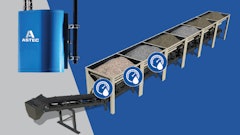
There are three major organizational bodies that make up the nationwide asphalt pavement and binder industry community. The National Asphalt Pavement Association (NAPA), the Asphalt Institute (AI), and the various state asphalt pavement associations (SAPAs). The three collaborate on the subject of asphalt promotion, education, and the selection of the top quality types of pavements, encourage economic growth, and, overall, ensure that the industry continues to have a bright future.
The Asphalt Pavement Alliance (APA) represents the partnership of all three groups together, and that is where Reed Ryan, the current director of the Utah Asphalt Pavement Association (UAPA) and the most recent past chair of the SAPAs, is headed to next as the new executive director.
From NAPA's press release: “Opportunities like this do not come around very often, so I am excited for the chance that all of the APA partners now have to write the next chapter of this alliance,” Ryan said. “I'm confident that the future is very bright for the APA and the essential industry we support.”
As the new executive director of the APA he will directly report the administration of the NAPA, names its president and CEO, Audrey Copeland, PhD., PE, while leading his own team made up of Buzz Powell, Ph.D., P.E., APA technical director; Michelle Kirk, director, Alliances & Awards and Brittyn Heisler, APA deployment manager. While the team is spread out across the country, Ryan will be traveling across the country to continue to promote asphalt in all its uses and advantages while coordinating remotely with with NAPA’s Regional Advisory Councils. Kirk and Heisler remain headquartered at APA’s office in Orange Park, Fla.
Up until this point, Ryan has been the sole leader of UAPA since it was organized 12 years ago. However, before he joined the asphalt industry, he had an extensive professional career, including working for Sen. Orrin Hatch. He earned a law degree from George Washington University Law School and a bachelor's degree in political science from Brigham Young University. His primary role at the APA will be to advance the cause of asphalt pavements in terms of quality, sustainability, and resiliency; this includes working with researchers and other experts to quickly bring to market improved techniques, materials, and technology. Currently, asphalt pavements control more than 90% of the U.S. market in pavement design material.
“Reed’s enthusiasm for bringing NAPA, the SAPAs, and other stakeholders together has been evident in his leadership of UAPA and the SAPAs along with his consistent, committed engagement with NAPA,” said Copeland. “His expertise and insights will empower the APA with fresh ideas to maintain the asphalt pavement industry’s superior product and reputation, while overcoming any challenges that may arise in the design or delivery of the industry’s products and services to communities across the nation.”
 Reed RyanProvided by NAPA
Reed RyanProvided by NAPA




























